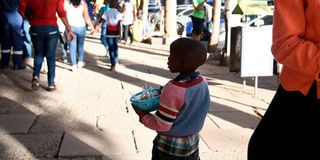Let us unite to get justice for all of Africa’s children

A child hawking sweats along Kimathi Street in Nairobi.
What you need to know:
- Most of the over 875 million students affected by Covid-19-related school closures are in Sub-Saharan Africa.
- They will most likely be pushed into child labour, trafficked, forcibly married or drafted as child soldiers.
Subjected to endless conflicts, social discrimination and economic exclusion, generations of Africa’s children have been denied their freedom. Moreover, the Covid-19 pandemic has threatened to reverse any progress made.
Most of the over 875 million students affected by Covid-19-related school closures are in Sub-Saharan Africa. They will most likely be pushed into child labour, trafficked, forcibly married or drafted as child soldiers. Worldwide, 152 million children are in child labour, mostly in Africa (one in five).
In the past decade, however, Kenya has made a lot of progress on child labour, which fell from 34.49 per cent in 2009 to 8.5 per cent in 2019. That is attributed to policies like free primary and secondary education, 100 per cent transition from primary to secondary education and constitutional social protection. But there are gaps in policy, threats from the impact of Covid-19 and insufficient funds.
We mark the International Year for the Elimination of Child Labour with the first increase in child labour in decades. In March, Inter-Parliamentary Union Secretary-General Martin Chungong and I launched the Fair Share to End Child Labour Campaign in Africa and the All-Africa Students Union.
Elected representatives from three countries — Williametta E. Saydee Tarr of Liberia, Jokate Mwegelo ofTanzania and Millie Odhiambo of Kenya — and leading civil society participants from Kenya, Uganda, Rwanda, Ghana, Cameroon, Malawi, Togo, Nigeria, Liberia pledged to lead the Africa coalition.
Key question
The campaign was launched globally in January, alongside survivors, faith and business leaders, global student, teacher and trade unions and heads of multilateral organisations such as WHO, Unesco, IPU, ILO and OECD to call for a fair share of financial resources, policies and social protection for the most marginalised children to end child labour.
The campaign raises a key question: Why is it that an American or European company cannot employ children in their countries but hire those from Africa, Asia or Latin America as workers? Child labour and racial discrimination are two sides of a coin.
Since 2000, the wealth of the world has increased by $40 trillion, a huge part of it generated on the backs of child and forced workers from marginalised communities. But it’s monopolised by the West.
ILO says sub-Saharan Africa witnessed a rise in child labour in 2012-2016, in contrast to other regions, with over a million additional victims.
During the Global March against Child Labour in 1998, my children and young friends of Africa marched shoulder to shoulder with me to demand their freedom. We are now coming together to march for an end to child labour. The Fair Share to End Child Labour campaign is pushing for a breakthrough for every child to be free from the shackles of labour.
I invite every African leader to join us in the fight for a fair share for the children of Africa.
Mr Kailash is a Nobel Peace Laureate. [email protected]





